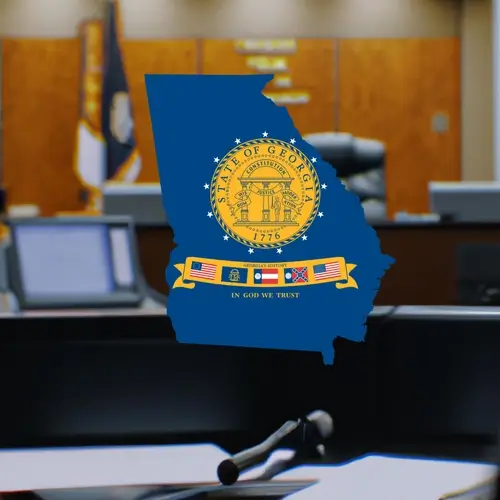Ever thought about how bail bonds work in Georgia? It’s a complex process but don’t worry! This article will break it down. We’ll explore the legal aspects of Georgia bail bonds. Now you’ll know your rights if you ever need bailed out of Fulton County jail. Let’s simplify the tricky subject of Georgia bail bonds and how bail works.
Learning How Bail Bonds Work in Georgia
When a person is arrested in Georgia, they are booked into jail and within 72 hours must appear before a magistrate judge. The judge will consider the bond amount (and if the defendant is eligible) using these four factors: defendant is not a flight risk, likelihood defendant will not commit another crime, defendant does not present a danger to the community and that the defendant will not intimidate or harass witnesses; this is also referred to as Ayala Factors.
The court may set conditions for release with a bail bond, such as attending all required court dates, refraining from committing any new crimes, and staying within state boundaries. If the defendant fails to adhere to these conditions, their bond can be revoked and they may be arrested.
How Much is Your Georgia Bail?
Depend on one of the largest Georgia bail companies with flexible payment plans and terms available. Enter in the total bail amount needed to determine your approximate bail costs of find out if you’re elgible for a bail loan:
In Georgia, Cash Bonds, Signature Bonds, Property Bonds and Surety Bonds are the four types of bail bonds available:
Cash Bonds
Cash bonds require the full payment of the bail amount upfront to the courts. Also, a cash bond is set by the judge for defendants who may be high risk defendants. Those defendants who have vilent crimes, deemed a flight risk or a lengthy criminal history. This type of bond must be paid in full and no surety can be used. It is all in the language of the bond. There are soem counties where they may accepts 10% of the bond, but you’ll need your criminal lawyer to ask the judge setting the bond to include that in the order.
Signature Bond
A signature bond is allowed if the defendant’s charges are minor and this is their first minor offense. This type of bond requires no money put up by the defendant to secure their release from jail. Simply put, a signature bond works like this: the defendant will sign a contract with the court promising they will show up to all court appointments and abide by all rules of their bond. If they break that contract they may be remanded to jail or need to hire a bail bondsman or pay the cash bond.
Property Bond
Using a property bond, the defendant will place their real property (land, real estate, other property) in lieu of cash for the bond. Property bonds can take time as an appraiser will need to calculate the actual value of the property being used for collateral. As well, the property posted must typically be valued at twice the amount of the bond.
Surety Bonds (Commercial Bail Bond)
Surety bonds are the lowest cost way to get out of jail by using a bail bonds agent. The defendant or their family will pay the bondsman a “premium” which is up to 15% of the Georgia bond. Keep in mind that while the court has rules to follow while out on bond, so does the Georgia bail bondsman. You’ll need to check in weekly with the bondsman, abide by court rules and possibly add your bondsman to all social media you subscribe to.
The Georgia bail premium fee cannot exceed 15% of the bond See: Georgia Code – Criminal Procedure – Title 17, Section 17-6-30
Georgia Bail Bonds Charges & Fees
When it comes to Georgia Bail Bonds Charges & Fees, it’s important to know the financial obligations. Here’s a breakdown:
| Bail Bond Fees of Bonds Less than $10k | 10% -12% of the total bail amount |
| Example: If your bail is $10,000, then the premium you will pay is $1,000 | |
| Bail Bond Fees of Bonds More Than $10k | 15% of the total bail amount |
| Example: If your bail is $100,000, then the premium you will pay is $15,000 | |
| Bond Execution Fee | $25 to sheriff’s office |
| Bond Completion Fee | $20 on release from jail |
Collateral may also be needed in certain cases. This could be property, vehicles, or valuable assets held as security until the bond is resolved.
Knowing these facts helps you be wise when posting bail. Plus, did you know the concept of bail bonds dates back centuries? Ancient civilizations like Rome and Mesopotamia had early forms of bail. Now, it’s evolved into what we know today – a way for people to get out of custody while awaiting trial.
Freeing someone? In Georgia, you can put a price on that.
How much of the bond do you pay in Georgia?
The amount you pay for a bond in Georgia depends on the offense and the jurisdiction. Here’s a table with estimated amounts:
| Offense | Bond Amount |
|---|---|
| Misdemeanor | $500 – $2,000 |
| Felony | $5,000 – $1,000,000 |
| Drug Offenses | $10,000 – $100,000 |
If my Georgia bail is $150,000, how much should I pay?
We get questions about bail prices all the time. To help calculate your bail, we’ve set up a simple bail schedule. Below is a simple table to help you better understand the premium rates for bail. Here, we will calculate bail using a standard of 10-15%:
| CASH BAIL AMOUNT | PREMIUM % | BAIL COST |
|---|---|---|
| $1000 | 10% | $100 |
| $5,000 | 10% | $500 |
| $10,000 | 10% | $1,000 |
| $20,000 | 15% | $3,000 |
| $50,000 | 15% | $7,500 |
| $100,000 | 15% | $15,000 |
| $150,000 | 15% | $22,500 |
| $250,000 | 15% | $37,500 |
| $500,000 | 15% | $75,000 |
| $1,000,000 | 15% | $150,000 |
Keep in mind that these figures may vary. Bail bonds can be higher or lower depending on the severity of the offense. Which is why it’s important to retain a criminal lawyer who can help get you a bail reduction. Also, take the time to ask a bondsman about zero down bail loans
The concept of using sureties or pledges to secure an individual’s release is centuries old. It dates back to ancient times when people were released after offering money or property as collateral. It’s also primary in the 8th Amendment to the Constitution
It’s important to understand the amount you need to pay for a bond in Georgia and what the rules are that you’ll need to follow while out on bond. Being aware of these amounts and court rules will help keep you out on bond.
How long does a bail bond last in Georgia?
In Georgia, bail bonds typically last until the criminal case is over or the bond is forfeited. A trial can take weeks, months, or even years, depending on the case. The defendant must meet all court conditions, attend all hearings, take a urine drug test frequently, not to commit any further crimes and check in with their bondsman. If they don’t, the bond may be revoked and they’ll go back to jail.
Sometimes, the bond can end sooner. If the charges are dropped or the defendant reaches a plea deal, it’s no longer necessary.
One incredible case happened in Georgia: a bail bond lasted for years! It involved a high-profile crime, with many investigations and trials. Despite the long process, the defendant was eventually acquitted. This proves how long a bond can last in rare cases. Even a former president has used a bondsman and has conditions to bail!
What is the difference between bail and bond in Georgia?
Bail and bond may seem like the same thing, but in Georgia they’re different. Bail is the amount the court sets to make sure you show up for court. In contrast, a bond is a written promise to pay the bail if you don’t show up. Bail can be paid in cash or property but bonds are normally secured through a bail bondsman who charges a fee.
It’s important to know the difference because it affects how quickly you get released. Paying bail will get you out right away, but with a bond, you’ll need to use a bail bondsman who will pay the whole amount to the court. This option can help if you don’t have enough cash.
When using a bond, you and your co-signer are financially responsible. If you don’t show up, you could face legal and financial consequences. Plus, the co-signer might have to pay the full bail amount or any fees the bondsman had.
To make sure you understand everything, get legal advice before making any agreements with a Georgia bail bonds company. Always keep your lawyer and bondsman informed and trust each other. That’ll help you get through this tough time.
Learning about bail and bond is the key to navigating Georgia’s bail process. Knowing your options gives you control and keeps you accountable. Knowledge is power when it comes to bailing in Georgia.
How is bail set in Georgia?
Bail is determined in Georgia based on factors like the type of crime, the defendant’s criminal record, and flight risk. It must be paid to release the defendant from jail until court.
Judges have discretion to decide the amount. They consider the defendant’s criminal record, ties to the community, and potential to flee. They take a balanced approach to make sure bail is fair and keeps public safety.
Certain crimes may have predetermined bail amounts according to state laws or guidelines. Violent or serious offenses often have higher bail than non-violent ones. Repeat offenders or those with a history of skipping court may face higher bail or no bail at all.
Georgia has been reforming their bail system to reduce bias. The goal is to not jail people solely because they cannot afford bail. This includes pre-trial services which assess risk level, not just money.
Understanding bail in Georgia helps understand the criminal justice system. It ensures defendants have a chance to leave jail and considers public safety. Georgia is striving to find a balance between justice and individual rights.
How long do you stay in jail if you can t make bail in Georgia?
In Georgia, bail can range from a few days to months or even years depending on the charges. To reduce your time in jail, you can seek help from a bail bondsman, request a bond reduction hearing, hire a defense attorney, or demonstrate good behavior.
Plus, you can get your bail money back!

Do you get bail money back in Georgia?
In Georgia, getting your bail money back is possible. It depends on a few factors. You post bail to guarantee you’ll show up to court. If you do, you get the money back.
If you pay the full amount of the bail upfront in cash, without a bond agent, you may get your money back when the case is resolved. There may be admin fees cut from the refund.
Different rules if you use a bond agent. They usually charge a non-refundable fee (10% of bail) and give the court a surety bond as insurance. Bond fees or collateral are not refundable. Only cash bail is.
Cases are unique. Outstanding fines or fees may be cut from the refund.
It’s essential to consult an experienced lawyer who specializes in criminal defense or is knowledgeable of Georgia’s legal system. They can guide you through the process and help ensure you understand your rights and obligations related to the bail bond.
Don’t let fear stop you from taking action and understanding how bail bonds work in Georgia. Seek professional legal advice right away to protect your rights and secure your freedom.
How to Get Bail in Georgia With No Money Down?
In Georgia, it’s possible to get bail without spending any money upfront. To do this, follow these five steps:
- Find a reliable bail bondsman. Look for a well-known company with good reviews and a history of helping people pay for bail.
- Get details about the defendant. Provide their full name, date of birth, and the place they’re held in custody.
- Check out collateral options. If needed, provide assets like real estate or vehicles as security for the bail.
- Set up a payment plan. Be transparent about your budget and negotiate a plan that is affordable.
- Follow the agreement. Ensure that payments are made on time and the defendant attends all court hearings.
Keep in mind that each case might have different requirements.
Frequently Asked Questions About Georgia Bail Bonds:
1. How do bail bonds work in Georgia?
When someone is arrested in Georgia, a judge sets a specific amount of money as bail, which is an assurance that the defendant will appear in court. If the defendant cannot afford to pay the full bail amount, they can seek the help of a bail bondsman. The bondsman charges a fee, usually around 10% of the total bail amount, and posts a bond with the court to secure the defendant’s release.
2. What is the role of a bail bondsman?
A bail bondsman is a licensed professional who provides a financial guarantee to the court that the defendant will appear for their court hearings. They charge a non-refundable fee, which is a percentage of the total bail amount, to cover their services. The bail bondsman takes responsibility for ensuring the defendant’s appearance in court and may also require collateral as additional security.
3. What happens if the defendant fails to appear in court?
If the defendant fails to appear in court as required, the court issues a warrant for their arrest and keeps the bail money or bond as a forfeit. The bail bondsman may hire a bounty hunter to locate and apprehend the defendant to avoid financial loss.
4. Can bail bonds be revoked?
Yes, bail bonds can be revoked under certain circumstances. If the defendant violates the terms of their release, such as committing another crime or attempting to flee, the court may revoke the bail bond. Once revoked, the defendant is typically held in custody until their court proceedings are completed.
5. How long does it take to get released after posting a bail bond?
After a bail bond is posted, the release time can vary depending on the specific circumstances and the workload of the jail. In most cases, the release process takes a few hours, but it can take several hours or even up to a day.
6. Are bail bond fees refundable?
No, bail bond fees are generally not refundable. The fees charged by a bail bondsman are for their services and are non-refundable, regardless of the outcome of the case. Even if the charges are dropped or the defendant is found not guilty, the fee paid to the bail bondsman is non-refundable.
For more information about the governance of the bail bonds Georgia industry, please visit the website of the Georgia Office of Insurance and Safety Fire Commissioner that oversees the licensing of bail bonds agents.


